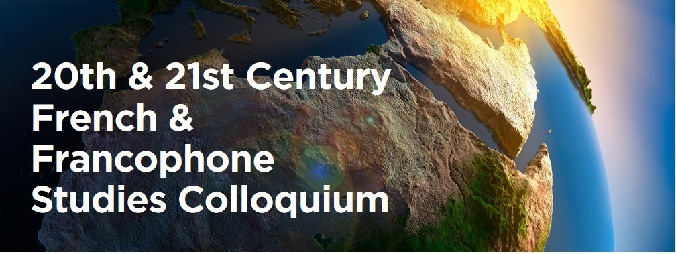
Modern Languages and Literatures, Department of
20th and 21st Century French and Francophone Studies International Colloquium
Parler la terre / Speaking the Earth
La terre nous unit tous. Parler la terre, c’est parler de soi-même, c’est parler de l’Autre, c’est parler de l’identité, de l’environnement, de la vie à tous les sens du mot. La terre permet l’existence des êtres humains, elle crée leurs cultures, fonde leurs imaginaires, complique leurs relations, fait et parfois défait leurs rêves. Comment représente-on la terre dans la littérature, dans l’art contemporain, dans le cinéma ? Comment la terre figure-t-elle dans la théorie postmoderne et post-coloniale, dans les théories du genre, et dans les études sociales et culturelles ? Comme le colloque 2020 aura lieu à l’Université du Nebraska-Lincoln, une institution « land grant, » située dans un état où l’agriculture dicte souvent l’économie et les tendances politiques, il nous semble opportun de considérer le rôle de la terre dans la production culturelle contemporaine d’expression française. Nous invitons des propositions de communication dans les domaines des littératures d’expression française, de la théorie littéraire, de l’histoire, des études culturelles et/ou postcoloniales, des études de genre, de la traduction, des arts tels que la musique, la danse, le cinéma, la photographie, et la bande dessinée.
The earth unites us all. To speak of the earth is to speak of oneself, of the “Other,” of identity, of the environment, of life in every sense of the word. The earth allows human beings to exist, it creates our cultures, founds our imaginaries, complicates our relationships, fulfills and sometimes frustrates our dreams. How is the earth or land represented in literature, in contemporary art, and in film? How does the earth factor into postmodern and postcolonial theories, gender theories, and cultural studies? As the 2020 colloquium will take place at the University of Nebraska-Lincoln, a land grant institution in a state in which agriculture frequently influences the economy and consequently the political situation and political tendencies, it seems appropriate to consider the role of the earth/land in contemporary cultural production of French expression.
We invite paper proposals in the following fields: literatures of French expression, literary theory, cultural studies, history, gender and postcolonial studies, translation, and art, including music, dance, film studies, photography, and the graphic novel.
Contributions below without a [pdf] icon are recorded videos of the presentations.
2020
Un regard écopoétique sur la Terre: évolutions du paysage français dans la photographie contemporaine, Anaïs Belchun
Sylvain Tesson : La Consolation de la forêt, Sylvie Blum-Reid
Représentation de la médina chez Namouss dans Le Fond de la Jarre d’Abdellatif Laâbi, Khanssaa Canning
The Returns of the Roman de la Terre : Défricheurs and their Migrant Others in the Canadien Imaginary, Alvin Y. Chuan
Recycled Things in Surrealist Collections, Kate Conley
La terre natale : à la source de l’écriture, chez Sidonie Gabrielle Colette, Michèle Druon
« Ceindre la Terre » : sur quelques tours du monde, Jean-François Duclos
La dimension cinématographique du paysage dans l’œuvre littéraire de Julien Gracq, El Arbi El Bakkali
“Traduit de l’américain” as Text and Paratext, Mort Guiney
Claiming the Land: The Spanish Presence in Colonial Algeria, Lavinia Horner
Writing after the Human: Marie Darrieussecq’s and Anne Garréta’s Posthumanisms, Annabel L. Kim
L’art féminin, un cri d’espoir pour l’humanité, Zohra Lhioui
Reconceptualizing Time, Space and Social Relationships: Queer Acts of Resistance by an AIDS Patient in Hervė Guibert’s To the Friend Who Did Not Save My Life, Salvador Lopez-Rivera
The Silent Revolution of Mohammed Dib's Qui se souvient de la mer, Sean Singh Matharoo
Overseas Lands, Cultural Citizenship, and National Belonging in Contemporary French Cinema, Cybelle McFadden
“Nous étions ici pour durer”: Memorialization and environmental advocacy in Véronique Tadjo’s En Compagnie des Hommes, Marda Messay
Intégration du genre dans la gestion des ressources en eau au Maroc (Nord-Ouest d’Afrique), El-Mostafa Mili
Really, Warren Motte
Remembering and experiencing the land in exile In Marie-Célie Agnant’s La Dot de Sara and Gisèle Pineau’s L’Exil selon Julia, Marie Paillard
Narrateur, narration et roman à thèse dans Sérotonine, Gerald Prince
Suivre le lilas et l’engoulement d’Amérique – vers une identité transmigrante dans La route du lilas par Éric Dupont, Simona Pruteanu
The Writer Under Trial: The Place of Space in Postcolonial Authorship, Sonali Ravi
Reading Antelme with Levinas: Recreational Activities in Concentration Camps, Arwa Reda
Expropriation and Forced Migrations: The Displacement of Colonial Agricultural Laborers in Mohammed Dib’s Algerian Trilogy, Benjamin Sparks
Terre brûlée : une éco-poétique du vide, Pierre Taminiaux
Ce que le mirage doit à l’oasis de Yasmina Khadra: Comment devient-on enfant du Sahara ?, Brigitte Tsobgny
Mourning the Loss of the Land in Le Clézio’s ‘Villa Aurore’ and ‘Orlamonde.’, Amanda Vredenburgh

